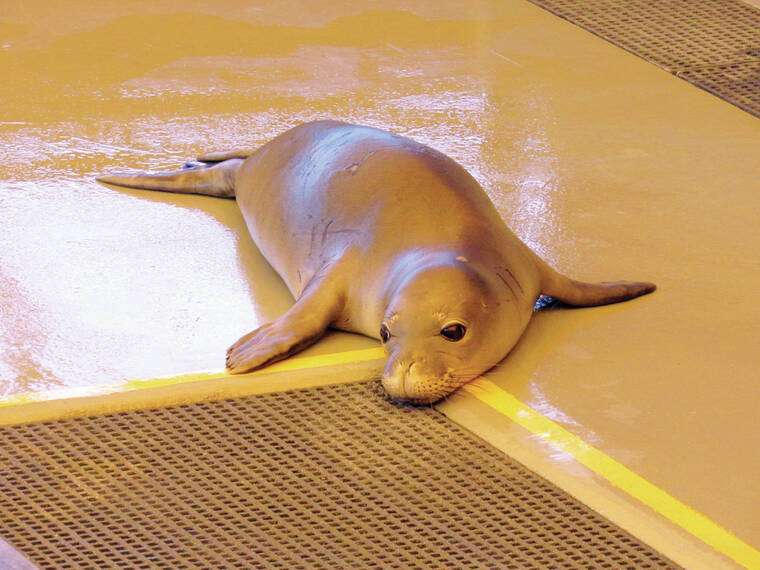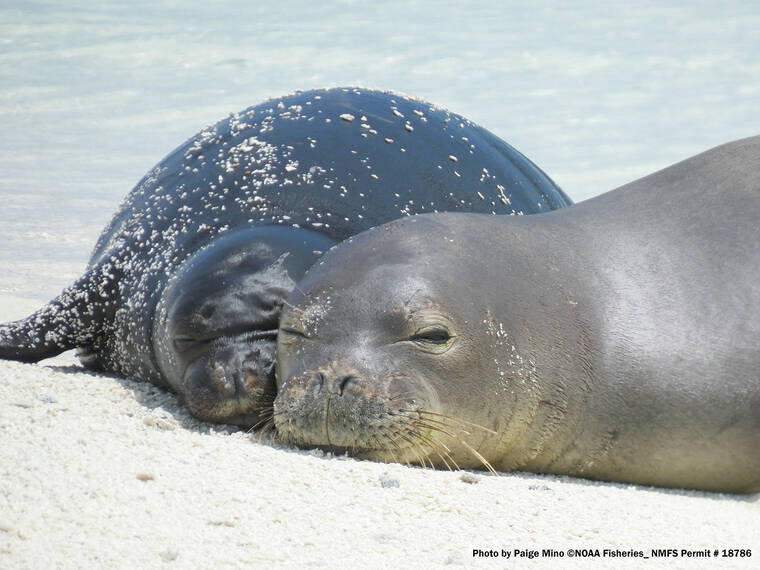KAILUA-KONA — In a sign of hope for the next generation of endangered Hawaiian monk seals and a critical boost to ongoing conservation efforts, researchers at the National Oceanic and Atmospheric Administration (NOAA) for the first time confirmed that two formerly released patients from The Marine Mammal Center’s hospital in Kailua-Kona, Ke Kai Ola, are now new moms. The news comes as the Center admitted four more seal pups into rehabilitative care and released another seal patient in partnership with NOAA.
“For an endangered species, every patient matters. The birth of these two Hawaiian monk seal pups from former patients is a real milestone to this endangered population and is a powerful example of the impact of conservation efforts by NOAA and programs like ours,” says Dr. Sophie Whoriskey, Hawaiian Monk Seal Conservation Veterinarian at The Marine Mammal Center. “The further addition of four female animals that were all underweight and unlikely to survive the winter without intervention is a further testament that our critical mission work is more important than ever.”
Before The Marine Mammal Center opened Ke Kai Ola in 2014, there were no options to save undersized pups. Now these pups that would have most certainly died in the wild are having their own pups, an important step to population growth for this endangered species.
“Without the opportunity for rehabilitation at Ke Kai Ola, almost every one of the seal pups rescued would have died. From decades of research, we know that pups in the same condition as our patients in rehabilitative care don’t live to see their first birthdays,” says Dr. Michelle Barbieri, Lead Scientist for NOAA’s Hawaiian Monk Seal Research Program. “We are grateful to our partners at The Marine Mammal Center for their support in helping save this endangered species, and ensuring these young pups receive a second chance to return to their ocean home.”
The mother seals, Meleana and Ama’ama, who rehabilitated at Ke Kai Ola in 2014 and 2015, gave birth at Manawai (Pearl and Hermes Reef) and Lalo (French Frigate Shoals), respectively, this summer. This is the first time NOAA researchers have detected births from Northwestern Hawaiian Island seals that have been rehabilitated at the Center’s hospital.
All aboard for a second chance
NOAA’s field researchers sighted the pups on their annual field camps to the Northwest Hawaiian Islands. Additionally, they discovered four more seals at risk and were able to successfully rescue them for transport.
Scientists onboard the NOAA Research Vessel Oscar Elton Sette performed physical exams and initial treatment on the four female monk seals rescued from Pihemanu (Midway), Manawai (Pearl and Hermes Atoll), and Lalo (French Frigate Shoals). The research ship shuttled three pups and one juvenile seal to Kona and from there they were quickly transported to Ke Kai Ola where they join Malama and Ikaika in care.
One pup was rescued from Manawai, DQ10, who weaned early at a small size and was unlikely to survive the winter season due to poor body condition. The other two pups from Lalo, QQ26 and QQ22, are also quite thin. The juvenile, PP32, is the oldest of the group and was rescued at Pihemanu as she was unlikely to survive due to poor body condition.
All four new patients appear stable and are settling in well to their new surroundings. Both PP32 and DQ10 are eating well on their own. QQ22 and QQ26 are both being tube fed for nutritional support and are showing strong interest in fish offers. They will also be treated as needed for intestinal parasites while in care.
Ahonui, a female pup that had weaned early at a small size on Kamole (Laysan Island) and was transferred into the Center’s care in late May, was successfully released back to the wild on Kamole in the early stages of the trip.
Since 2014, the Center has rehabilitated and released 38 monk seals, most of which have been rescued from and returned to the Northwestern Hawaiian Islands as part of the Center’s partnership with NOAA Fisheries, utilizing resources in the area to identify seals in need, rescue and rehabilitate them, and give them a second chance at life.
The Center’s partnership with NOAA Fisheries and other cooperating agencies is more important than ever to prevent this endangered species from becoming extinct.
How the public can help
The public should keep a safe distance of at least 50 feet from monk seals and at least 150 feet from monk seal mothers with pups, and report sightings to the Center’s response team via 24-hour hotline: on Hawai‘i Island at 808-987-0765 and on Maui at 808-292-2372.
Report hooked, stranded or entangled monk seals to the statewide NOAA Fisheries Marine Wildlife Hotline at 1-888-256-9840. NOAA Fisheries also recommends these best practices to reduce injuries to monk seals when fishing.





